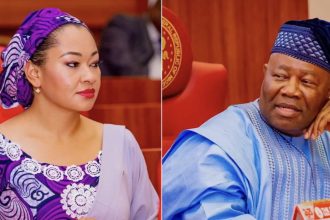The Enugu State High Court, under the leadership of Justice A.O Onovo, has dismissed a lawsuit filed by the late Chief (Dr) Debe Odumegwu Ojukwu against the widow of the late Ikemba Nnewi, Dim Chukwemeka Odumegwu Ojukwu, Bianca Ojukwu.
Debe had approached the court questioning the validity of Ikemba’s will, claiming his entitlement as the first son of the late Biafra leader. He alleged that Ojukwu’s will had been tampered with and sought an order to prevent Mrs. Bianca Odumegwu-Ojukwu from interfering with the administration of the late Ikemba’s estate. Additionally, he asserted his entitlement to the letters of administration for the late Odumegwu-Ojukwu’s estate, claiming that Ojukwu had passed away without leaving a will.
In 2011, Ojukwu passed away, leaving behind a will that named his wife, Bianca, and James Ezike as trustees and executors of his estate. Debe filed the lawsuit in 2013, contesting the validity of the will, claiming to be the deceased’s first son but not mentioned in the will.
The court examined whether Debe had provided sufficient evidence to establish his status as the deceased’s son and whether the will was properly made and valid. The court also determined whether Debe and his daughters were entitled to benefit from the deceased’s estate.
Despite Debe passing away in 2018 while the case was ongoing, his two daughters applied for substitution in the lawsuit, which the court allowed. After a thorough examination of the evidence, the court concluded that Debe failed to prove he was acknowledged as the biological son of the late Dim Chukwuemeka Odumegwu Ojukwu during his lifetime.
Regarding the legitimacy of Ojukwu’s will, the court found that the will and codicil were duly executed and legally binding. The court held that Debe’s children had no beneficiary interest in the estate of the late Ojukwu through their father, as he had failed to prove his paternity, and therefore, the case had no merit.
Justice Onovo emphasized that public opinion could not be the sole basis for determining the paternity of a child born out of wedlock, highlighting that acknowledgement of paternity could be inferred from specific acts by a father towards a purported son, which were not evident in this case.




